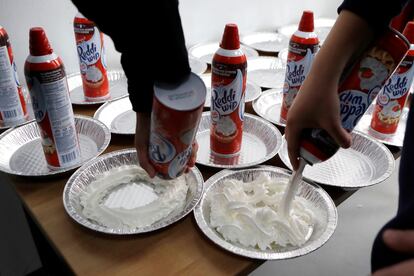Is it illegal for people under 21 to buy whipped cream canisters in New York?
An internet hoax forces authorities to clarify the intention of a law that prevents the sale to this age group of nitrogen cartridges, which have a narcotic effect if inhaled


The story brings together misinformation, social media pranksters, haute cuisine and a good dose of hysteria. It affects young people under the age of 21 in New York State, cooks fond of experimentation and a Democratic representative in the New York Senate, the promoter of a law that prohibits the sale of nitrogen cartridges for culinary sprays to young people.
Those elements gave rise to a rumor that has taken over Twitter: the prohibition of the sale of nitrogen cartridges, in order to prevent recreational abuse of nitrous oxide (N2O). The piece of misinformation went from a meme to a news story. Headlines declared that “You Need to Be 21 to Buy Whipped Cream in New York.”
The senator who promoted the initial law (New York State Law S.2819A, approved by the Legislative Assembly in 2021) was forced to intervene. In a message on Twitter, Senator Joe Addabbo clarified that whipped cream is one thing. The gas in the cartridge that allows gourmets to experiment with textures and siphon volumes, and which, inhaled, has a stimulating stupefying effect, is quite another.
Even The New York Times and the Associated Press have joined the tabloid buzz to dismantle the rumor and clarify the details of the whipped cream ban. “A state law intended to curb the use of nitrous oxide among teenagers has been interpreted by some stores as an all-out ban on whipped-cream canisters for customers under the age of 21,” the newspaper noted on Wednesday.
To justify the strange law, which came into force in November, Democrat Addabbo explained that in his borough, Queens, empty chargers or cartridges abounded among the street garbage. “The need to limit the access and sale of whippits first became apparent after receiving constituent complaints about empty canisters on neighborhood streets. This law will help to protect our youth from the dangers of this lethal chemical, while helping to clean up our neighborhoods,” he said. Addabbo, whose office has not responded to this newspaper’s request for comment, stresses in the statement the danger of inhaling N2O.
Addabbo’s clarification, which described the controversy as a “totally erroneous interpretation of the law,” is a relief in the dog days of summer: adults and children will be able to consume whipped cream at will, in bulk. There will be no need to show ID, as indicated by the pseudo-news websites that spread the error: an article that stated as much was retweeted more than 5,000 times in hours. The confusion among social media users, media figures and business owners who denounced the supposed ban is yet another chapter to the growing distrust of news media. But the truth is that the recreational use of nitrous oxide, commonly called laughing gas, causes a euphoric effect and serious health risks. That is what the legislation is trying to prevent, in a country hit by the opioid crisis, where any narcotic soon becomes popular. The language of the law, which described the cartridges as “whipped cream magazines,” caused widespread confusion online and in stores.
Several conclusions can be drawn from the episode. First is the fact that news (and non-news too) are resurrected long after they are produced, as if they had a life of their own. Second is that the frivolous news items common in the late summer –meant to fill the lull– are no longer a monopoly of the press: they have found a limitless voice on the internet. Finally, we’ve learned that the convoluted American bureaucracy can still produce surprises.
Tu suscripción se está usando en otro dispositivo
¿Quieres añadir otro usuario a tu suscripción?
Si continúas leyendo en este dispositivo, no se podrá leer en el otro.
FlechaTu suscripción se está usando en otro dispositivo y solo puedes acceder a EL PAÍS desde un dispositivo a la vez.
Si quieres compartir tu cuenta, cambia tu suscripción a la modalidad Premium, así podrás añadir otro usuario. Cada uno accederá con su propia cuenta de email, lo que os permitirá personalizar vuestra experiencia en EL PAÍS.
¿Tienes una suscripción de empresa? Accede aquí para contratar más cuentas.
En el caso de no saber quién está usando tu cuenta, te recomendamos cambiar tu contraseña aquí.
Si decides continuar compartiendo tu cuenta, este mensaje se mostrará en tu dispositivo y en el de la otra persona que está usando tu cuenta de forma indefinida, afectando a tu experiencia de lectura. Puedes consultar aquí los términos y condiciones de la suscripción digital.








































